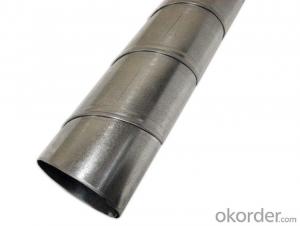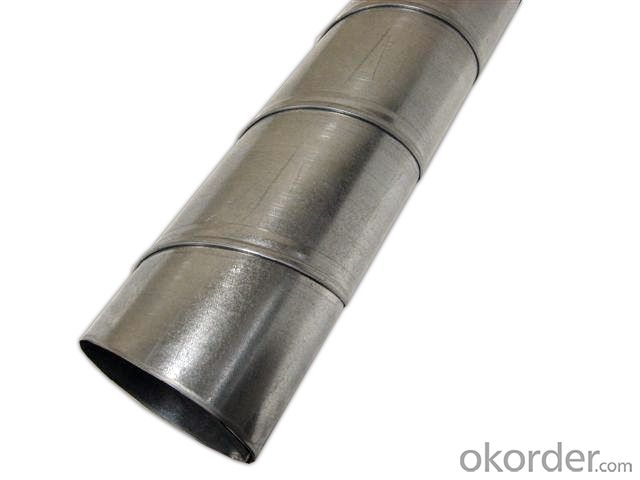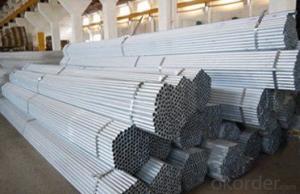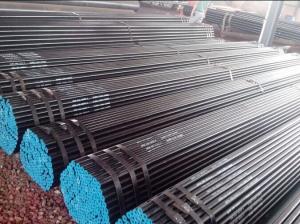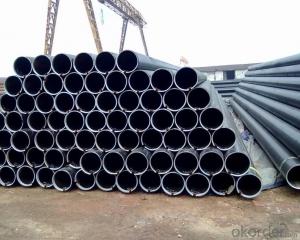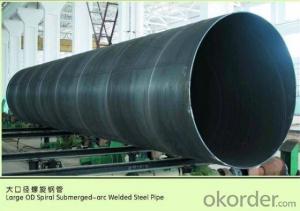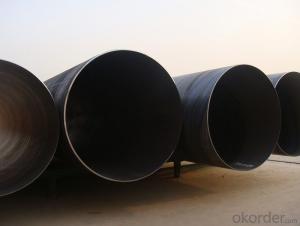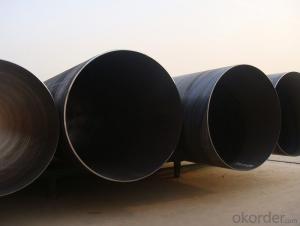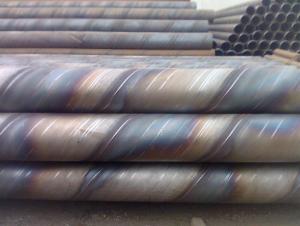SPIRAL WELDED STEEL PIPE 12‘’ 36‘’ 48‘’ CARBON
- Loading Port:
- Tianjin
- Payment Terms:
- TT OR LC
- Min Order Qty:
- 5 m.t
- Supply Capability:
- 3000 m.t/month
OKorder Service Pledge
OKorder Financial Service
You Might Also Like
Packaging & Delivery
Packaging Detail: | standard export packing or as customer's requirement |
Delivery Detail: | within 10 - 30 days |
Specifications
Spiral Welded Steel Pipes and Tubes
1.Material:Q195-Q235
2.Length:1-12m
3.WT:1.0-14mm
4.O.D.:20-273mm
Spiral Welded Steel Pipes and Tubes
Product Description:
1.Material : Q235,Q345,L245,L290,L360,L415,L450,L485,GrB,X42,46,X52,X56,X60,X65,X70,X80,X100
2,Standard: SY/T5037-2000,GB/T9711-2011,API Spec 5L PSL1/PSL2,ASTM A252\A53,ISO3183,DIN17172,EN10217,JIS G3457,AWWA C200,ASTM A139,ASTM A671,ASTM A672
3.Wall thickness: 3.0mm-30mm
4.Outer diameter: φ168mm-3020mm
5,Length: 5m-12m or as your requirement
6,Corrosion protection standard: DIN30670,DIN30671, AWWAC210, AWWA C203, SY/T0413-2002,SY/T0414-2002
7,Application: Oil, gas, natural gas, water pipe, thermal electricity pipe, steel structure engineering, etc
Q195-q345 Material Steel Pipe's Materials
Elements | Chemical Compsition% | Mechanical Property | ||||||
C% | Mn% | S% | P% | Si% | Yield Point (Mpa) | Tensile Strength(Mpa) | Elongation | |
Q195 | 0.06-0.12 | 0.25-0.50 | <0.050< span=""> | <0.045< span=""> | <0.030< span=""> | >195 | 315-430 | 32-33 |
Q215 | 0.09-0.15 | 0.25-0.55 | <0.05< span=""> | <0.045< span=""> | <0.030< span=""> | >215 | 335-450 | 26-31 |
Q235 | 0.12-0.20 | 0.30-0.70 | <0.045< span=""> | <0.045< span=""> | <0.030< span=""> | >235 | 375-500 | 24-26 |
Q345 | <0.20< span=""> | 1.0-1.6 | <0.040< span=""> | <0.040< span=""> | <0.55< span=""> | >345 | 470-630 | 21-22 |
Packaging & Delivery
Packaging Detail: | Normal exporting packing,in container or bulk vessel or as per clients' request |
Delivery Detail: | 2 months after confimed contract |
Specifications
Large Diameter API 5L X70 PSL2 LSAW Steel Pipe
Grade: X42, X46, X50, X52, X60, B, C
OD: 1.5"-28"
WT: SCH10-SCH160
Brand:TPCO
Large Diameter API 5L X70 PSL2 LSAW Steel Pipe
Specifications:
u Standard: API 5L
u Grade: B, C, X42, X46, X50, X52, X56, X60, X65, X70, X80
u OD: 1.5"-28"
u WT: SCH10-SCH160
u Length: 5-12m
u Ends Finish: plain end, bevel end, grooved end
u Surface Treatment: bare, black varnished, oiled finish, red color, anti-corrosion, 3PE, FBE or epoxy coating
u Technique: hot rolled or cold drawn
u Application: api 5l steel pipe for conveying oil, water, gas
u Invoicing: based on theoretical weight or actual weight
u Payment Terms: L/C at sight, T/T or Western Union
u Trade Terms: FOB, CFR, CIF
u Certification: ABS manufacturing assessment, ABS design assessment, API 5CT, API 5L, DNV manufacturer certificate, ISO9001 quality management system certificate, ISO14001 environment management system certificate, GB/T28001 occupational health and safety management system certificate, A1 class manufacturing license of special equipment certificate, CCS, GL, LR, SGS, TüV, PDE
- Q: Can steel pipes be used for fire sprinkler systems?
- Yes, steel pipes can be used for fire sprinkler systems.
- Q: Outside diameter 60, thickness 3.5 seamless steel tube, how many kilograms per meter?
- Steel tube Kg/m (including seamless steel tubes and welded tubes) theoretical formula per meter weight: W=0.02466 * S * (D-S)Of which: S - wall thickness (mm), D - steel tube diameter (mm), W - kg / M
- Q: What type of steel pipe for security windows?
- General anti-theft window through the round tube is 3 cm square tube, 22.5 mm diameter round tube, also can use all square tube to do, if you want to median 304, the pipe is estimated more expensive, the market to do the price in 60 to 110 range. As for plastic steel, Anhui conch brand, the price of 180 this way. Aluminum alloy 110 to 230 specific look what material?!
- Q: Can steel pipes be used for underground sprinkler systems?
- Yes, steel pipes can be used for underground sprinkler systems. However, it is important to note that steel pipes are not as commonly used as other materials like PVC or polyethylene due to their susceptibility to corrosion. If steel pipes are chosen for this application, they should be coated or lined to protect them from underground moisture and ensure their longevity.
- Q: Are steel pipes fire resistant?
- Yes, steel pipes are considered fire resistant due to their high melting point and ability to withstand extreme heat.
- Q: What are the different factors affecting the flow rate of steel pipes?
- There are several factors that can affect the flow rate of steel pipes. 1. Pipe diameter: The size of the pipe plays a significant role in determining the flow rate. Generally, larger diameter pipes allow for greater flow rates, as they have a larger cross-sectional area for the fluid to pass through. 2. Pipe length: The length of the pipe also affects the flow rate. Longer pipes tend to have higher friction losses, which can reduce the flow rate. Additionally, longer pipes may require higher pressure to maintain the desired flow rate. 3. Fluid viscosity: The viscosity of the fluid passing through the pipe is an important factor. Viscous fluids, such as heavy oils, have a higher resistance to flow, leading to lower flow rates. On the other hand, less viscous fluids, like water, have lower resistance and can achieve higher flow rates. 4. Pressure difference: The pressure difference across the pipe is a driving force for the flow. A higher pressure difference will result in a higher flow rate, while a lower pressure difference will reduce the flow rate. 5. Surface roughness: The roughness of the inner surface of the pipe affects the flow rate. Rougher surfaces create more turbulence and friction, resulting in a lower flow rate. Smoother surfaces, on the other hand, minimize turbulence and friction, allowing for a higher flow rate. 6. Temperature: The temperature of the fluid can impact its viscosity and density, which in turn affects the flow rate. Higher temperatures generally reduce the viscosity of fluids, leading to increased flow rates. 7. Pipe material: Different pipe materials have varying roughness and resistance to flow. Steel pipes, for example, typically have a smoother inner surface compared to pipes made of other materials, resulting in higher flow rates. 8. Pipe fittings and bends: The presence of fittings, valves, and bends in the pipe can cause flow restrictions and pressure drops, which can decrease the flow rate. Proper design and placement of these components can minimize their impact on the flow rate. Overall, the flow rate of steel pipes is influenced by a combination of these factors, and understanding their effects is crucial for designing and optimizing fluid flow systems.
- Q: Are steel pipes suitable for transporting gas?
- Yes, steel pipes are suitable for transporting gas. They have high strength and durability, making them capable of withstanding the pressure and stress involved in gas transportation. Additionally, steel pipes have excellent resistance to corrosion, ensuring the safety and integrity of the gas being transported.
- Q: How can galvanized steel pipe be connected with stainless steel pipe?
- Attention should be paid to the zinc coating at the side of the groove before welding. It is OK to brush silver powder after welding. There is a lot of information about the welding of carbon steel and stainless steel. Just check it online.
- Q: How are steel pipes used in the renewable energy industry?
- Steel pipes are widely used in the renewable energy industry for various purposes. They are commonly used in the construction of wind turbine towers, where they provide structural support and stability. Steel pipes are also used in the installation of solar panel systems, serving as a reliable conduit for transporting fluids, such as water or heat transfer fluids, within the system. Additionally, steel pipes are utilized in the transportation of renewable energy resources, such as natural gas or hydrogen, as they offer durability and strength to withstand high-pressure conditions.
- Q: Can steel pipes be used for geothermal systems?
- Yes, steel pipes can be used for geothermal systems. Steel pipes are commonly used in geothermal systems for their high strength, durability, and ability to withstand high temperatures and pressures. They are also resistant to corrosion, making them suitable for long-term use in geothermal applications.
Send your message to us
SPIRAL WELDED STEEL PIPE 12‘’ 36‘’ 48‘’ CARBON
- Loading Port:
- Tianjin
- Payment Terms:
- TT OR LC
- Min Order Qty:
- 5 m.t
- Supply Capability:
- 3000 m.t/month
OKorder Service Pledge
OKorder Financial Service
Similar products
Hot products
Hot Searches
Related keywords
